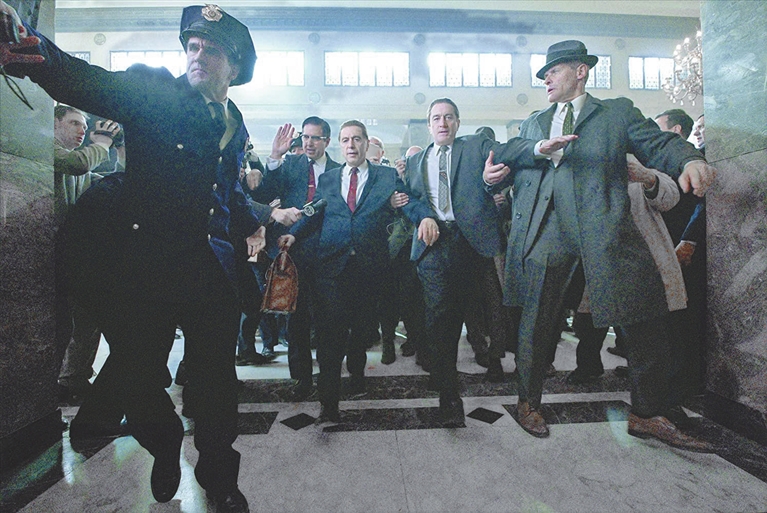
Starring: Robert De Niro, Al Pacino, Joe Pesci, Harvey Keitel, Ray Romano, Bobby Cannavale, Anna Paquin, Stephen Graham, Stephanie Kurtzuba Director: Martin Scorsese Sinful and sorrowful.” Those affecting words from a young priest’s prayer are loaded with contemplative weight when repeated by Robert De Niro as Frank Sheeran, living out his days in the solitude of a Catholic retirement home. He’s a dinosaur whose mob cohorts have been killed or died out and what’s left of his family has detached themselves from him, his sadness matched by their bitterness. A melancholy sense of looking back also pervades the best parts of “The Irishman,” in which Martin Scorsese reunites with his most totemic screen actor to tell a sprawling gangland saga that’s by turns flinty, amusing, richly nostalgic and rueful. Anchoring the drama are three tremendously effective contrapuntal performances. De Niro may be playing the title figure but Frank is also the least flashy role, constrained to some degree by the inherent limitations in any middleman character. It’s when his hardened, get-the-job-done grimace dissolves to hint at the conflicts within the WWII veteran turned mob heavy that Frank’s calloused humanity is revealed. As his mentor in the criminal underworld, Russell Bufalino, Joe Pesci emerges from retirement to give a superbly measured performance as a don whose quiet thoughtfulness and composure don’t soften his ruthlessness. And teaming here for the first time with the director, Al Pacino is in invigoratingly fine form as pugnacious labor union leader Jimmy Hoffa, the actor’s tendency toward grandstanding bluster deftly channeled into a hilariously colorful hothead, unable to control his irascibility and power-trip ego even as they dig his grave. Working from Charles Brandt’s 2004 book on Sheeran, “I Heard You Paint Houses,” scriptwriter Steven Zaillian uses the framing device of an elderly Frank, near the end of his life, telling his story to an unseen interlocutor. Within that frame is a second structural peg, an interstate road trip taken in the mid-1970s by Frank, Russell and their respective wives to attend a Bufalino family wedding. That thread is played partly for low-key comedy, with fastidious Russell banning smoking in the car, and the women demanding constant cigarette breaks. But the humor also makes for a more impactful dark turn when one of Russell’s many business stops becomes a job of extreme gravity for Frank, unlike the cold efficiency he brings to most kills. The movie skips back to Frank’s early days as a truck driver for Teamsters 107 out of Philadelphia in the 1950s, and his first encounter with Russell at a Texaco gas station. Frank has no idea of the mobster’s identity, but he knows enough to recognize him as a man of consequence, and to remember him when they meet again. In the meantime, he’s started ripping off his suppliers and selling beef on the side to Philly crook Skinny Razor (Bobby Cannavale), a former butcher who hasn’t lost his taste for steak. Skinny introduces him to the city’s new crime boss, Angelo Bruno (Harvey Keitel), and to the latter’s Northern Pennsylvania counterpart, Russell. The latter instantly takes a shine to the Irishman, who learned to speak passable Italian during his four years of combat there. Frank starts out collecting cash for his new mob associates, with occasional intimidation required. When an error of judgment causes him to take on a side job detrimental to one of Angelo’s businesses, Russell’s affection for him gets Frank a pass, but it also requires him to carry out his first kill. At the same time, his late hours and shady friends make his family nervous. The real meat in the narrative — and the point at which the film gains welcome momentum — arrives when Russell sends Frank to help out Hoffa, who the movie tells us was the most powerful man in the country after the president in the ’50s and ’60s. While the film points to mob support as a factor in getting John F. Kennedy elected to the White House, Hoffa is outraged when the president appoints his brother Robert (Jack Huston) as Attorney General and he goes after the union leader for corruption. His other nemesis is Anthony Provenzano, known as “Tony Pro” (Stephen Graham), a swaggering, mob-affiliated New Jersey Teamster who keeps stepping on Hoffa’s toes. The climax follows Brandt’s book in explaining Hoffa’s 1975 disappearance according to claims Sheeran made shortly before his death in 2003. This yields some terrific scenes and allows De Niro to dig beneath the surface of his pragmatic enforcer character, uncovering the troubled depths of a man cornered into betraying a friend he genuinely loves. That gives the final hour an affecting elegiac quality that also carries the poignant suggestion of Scorsese and De Niro reflecting back on their shared cinematic past. (SD-Agencies) | 
